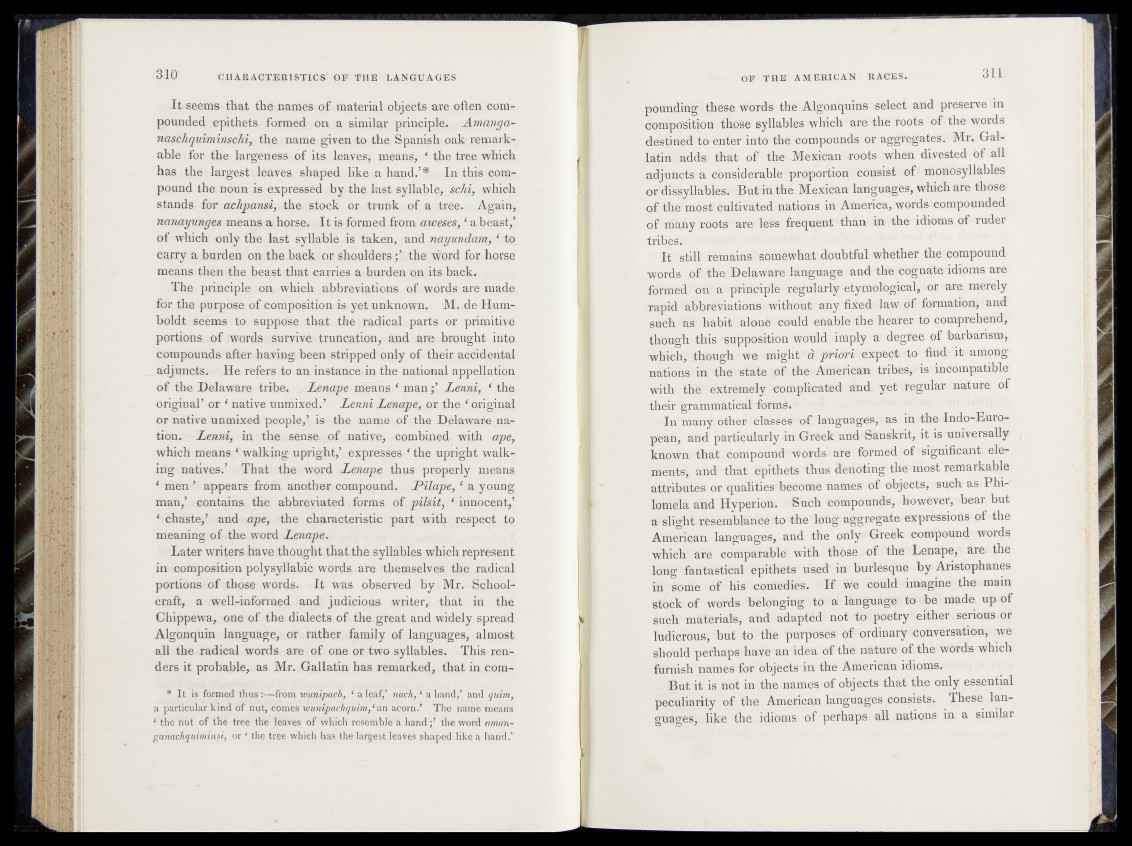
I t seems that the names of material objects are often compounded
epithets formed on a similar principle* Amanga-
naschquiminsehi7 the name given to the Spanish oak remarkable!
for the largeness of its leaves^ means, ‘ the tree which
has the largest leaves shaped like a hand.’* In this compound
the noun is expressed by the last syllable, schi, which
stands for achpand, the stock or trunk of a tree. Again,
nanayunges means a horse. It is formed from aweses,‘ a beast/
of which only the last syllable is taken, and nay undam, 1 :to
carry a harden on the back or shoulders / the Word for horse
means then the beast that carries a burden on its back.
The principle on which abbreviations of words are made
for the purpose of composition is yet unknown. JVLvde Humboldt
seems to suppose that the radical parts or primitive
portions of words survive truncation, and are, brought into
compounds after having been stripped only of their accidental
adjuncts. He refers to an instance in the national appellation
of the Delaware tribe. henape means ‘ m a n / henni, ‘ the
original’ or ‘ native unmixed.’ henni henape,or the ‘ original
or native unmixed people/ is^ the name of the Delaware nation.
henni, in the sense, o f native, combined with ape,
which means ‘ walking upright,’ expresses ‘ the upright walking
natives.’ That the word henape thus properly means
‘ m en ’ appears from another compound. JPilape, 1 a young
man,’ contains the abbreviated forms of pilsit, f\ innocent,’
‘ chaste,’ and ape, the characteristic part witli respect to
meaning of the word henape.
Later writers have thought that the syllables whicli represent
in composition polysyllabic words are themselves the radical
portions of those words. It was observed by Mr. Schoolcraft,
a well-informed and judicious writer, that in the
Chippewa, one of the dialects of the great and widely spread
Algonquin language, or rather family of languages, almost
all the radical words are of one or two syllables. This renders
it probable, as Mr. Gallatin has remarked, that in cora-
* It is formed thus from wunipach, * a leaf,’ n a c h ,e a hand,’ and q u in t,
a particular kind of but, comes w u n ip a c k q u im /a n acorn.’ The name means
6 the tint of the tree the leaves of which resemble à hand ;’ the word a m a n -
a a n a c h q u im in si, or | the tree which has the largest leaves shaped like a hand.’
pounding : these words- the Algonquins select and preserve in
composition -those Syllables winch are the toots -of the words
destined to'-etoter into the- compounds' or »aggregates.' Mr. Gallatin
adds that of- the MexicanlTos'ts'Whendivested of all
adjuncts a considerable proportion■ rconsist wjm monosyllables
or dissyllables. B ut in thé Méxidanf languages, which are those
of thefmost^ùltivMedmaftioas in-!Ameiiba,words compounded
of many roots are less frequént -than in - the idioms of ruder
Oill,ytnt>, r |
It stiil rëmains 1 somewhat doubtful whither thé compound
. words of fife Delaware‘language- and thbJeognateddiOmS are
formed
-Mpi#%bbréviatioBS without-1 any’fixed-- law^# formRti®^ and
such as habit alönê’ ' CèuM ’enrildefhehë&rér to comprehend,
thhugh this supposition would imply* a deg^eejof barbarism,
- which, thôügh we i h i g h f î !to âruhib among
natialiS in tbe^tate Of thri America» tribes,-risnacompatiMe
with fchè ' éxtremèlÿ comptteRtpl' atad, y^'fregularj nafeufe» Of
their gmmtinhttCî^’&Whài:*^
In many odiersdlasse§%f Mfegua^ësjaas; in the Indo-Buró-
pdan, and particularly in Gt*ëeîb unddlinsfeity it is^uïversæUy
known that eompoundwórds are for niëd-fef'Significant ele-
BÉfèntö* arid" that ^ h é t ^ t h u s deriWtin^H^^st’^markable
attributes or qualities^heComeriafeeS of ©fejeets,u &uch asi Philomela
arid Hyperion. Such -compounds, h© wever,obear hut
a * slight resemblance to the Mfig^ggrOgitn expressbrismf; the
American languages, and the oOly^Gleèk compound words
which are comparable with thóM.yöf dtlm iLenta|^^ are^lhe
long fantastical epithets’ used in* burlésquö' b y Aristophanes
in,some of hi* eoniedim feM corild imagine« tha^main
stock of words bMOrigirig to a language’td be made up of
such materials, and , serious - dr
ludicrous, but to the purposes of ordinary Conversation,
should perhaps have an idea Of the* nature of the* Wdrds which
furnish names for objeets in the Ameriean idioms.
But it is not in the names of objects that the only essential
peculiarity of the American languages consists. These languages,
like the idioms of perhaps all nations in a similar